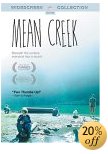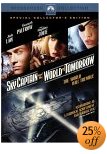Movie Reviews
The reviews below have been collected from U.S. Catholic's Culture in Context department, which appears each month in the print edition of U.S. Catholic. All the reviews below are by Culture in Context columnist Pat McCormick unless otherwise noted.
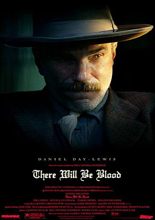 There Will Be Blood
There Will Be Blood
Directed by Paul Anderson (Miramax, 2007)
Paul Anderson’s adaptation of Upton Sinclair’s 1927 novel Oil! joins an impressive list of Hollywood classics lancing the boil of ambition and greed in the underbelly of the American dream. Like Citizen Kane, The Treasure of the Sierra Madre, The Godfather, Chinatown, and Wall Street, Anderson’s brooding and violent epic takes aim at a ruthless and savage winner-take-all ethic buried deep in the American psyche.
In this sweeping tale of America’s late 19th-century oil rush, Daniel Plainview (Daniel Day-Lewis) is a simmering caldron of ambition and rage who pickaxes into the belly of the earth and wades through competitors, opponents, and bystanders like a human earthquake. Having struck oil and started his own company, the up-and-coming wildcatter learns of an untapped field beneath a poor desert community and sets out to capture this bonanza before the locals or big oil men can act. Success here means unbridled wealth and vanquishing every trace of a desperate childhood. This is to be his Rosebud.
Plainview is a ruthless combatant who is driven by an unpolished, almost feral rage and jealousy, unable to tolerate any success in others. To mask this madness and win the trust of local landowners, he presents himself as a family man, raising an orphaned boy as his son, and there are haunting scenes early in the film that suggest the child could offer a path to redemption. Here is the struggle for Plainview’s soul. Will he choose to protect the child or cast him overboard for the sake of his ambition?
Suffice it to say that the god worshipped in There Will Be Blood is not compassion but mammon, and both Plainview and the Pentecostal preacher who opposes him in his struggle to dominate the people of this small town care little for anything but their own ambition and greed. As a result, the blood in this tale does not point to the ties that bind us to others but to our violence spilling onto the ground.—Patrick McCormick
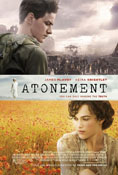 Atonement
Atonement
Directed by Joe Wright (Focus Features, 2007)
Older Catholics may recall a story about the standard penance for gossip. “On a blustery day shake out the contents of a feather pillow from a high window. The next day collect every feather scattered across the landscape.”
It cannot be done, of course, and in Joe Wright’s translation of Ian McEwan’s novel the young (and not-so-young) Briony Talis must watch helplessly as the unfolding consequences of her lie wreak havoc in the lives of her older sister, Cecilia, and the housekeeper’s son, Robbie Turner. Besotted with a child’s notions of romance, the precocious and naive 13-year-old playwright is shocked by her discovery of the adult passions Cecilia and Robbie have for one another. In a moment her knight has become a beast, and so when her young cousin reports a beastly sexual attack it is all too easy for Briony to cast Robbie in the role of savage predator.
Here is a tale that grabs her audience by the throat, shines a spotlight on her talents as master storyteller, and vents her unconscious rage at being slighted so by these older lovers. But it is also a fiction that ultimately shatters her world, dispatching Robbie to prison and the carnage of war, exiling Cecilia from the family, and providing a real predator with everlasting immunity.
In time an older Briony is haunted by the effects of her tale. But taking back a lie is not as easy as speaking one, and her fiction has taken on a life of its own, weaving itself deeply into the fabric of so many lives. Briony the recanter lacks the power of Briony the accuser.
And so Briony returns ultimately to fiction. At the end of a distinguished career as a novelist, the dying storyteller invents a bestselling tale in which Robbie and Cecelia finally get the life they might have had without her lie. Can this fiction catch all the feathers of her first lie? Probably not, but it is the only story she has to tell, and if it is well told, perhaps it will cover as much ground.—Patrick McCormick
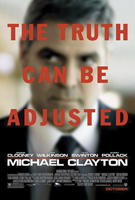 Michael Clayton
Michael Clayton
Directed by Tony Gilroy (Warner Brothers, 2007)
After exploring the murky morality of the media, geopolitics, and the Cold War in Good Night and Good Luck, Syriana, and The Good German, George Clooney has turned the spotlight of conscience on the underbelly of corporate law and multinational agribusinesses. By playing a character who might be suited up for the wrong team, he has given his audience a chance to examine the beam in our own eye.
Michael Clayton (Clooney) is the “fixer” at a high-end law firm, the go-to guy for a backroom deal or a small bag of cash. But this time out, the firm needs somebody to fix one of their own, and Clayton needs to succeed to keep his own career and life out of the Dumpster.
Unfortunately keeping the firm’s lead attorney, Arthur Edens (Tom Wilkinson), from sabotaging its biggest case and undermining an upcoming merger will mean more than getting the manic-depressive lawyer back on his meds. The wildly erratic Edens has proof their client poisoned American farmers and wants to hand this evidence over to the other side. Not surprisingly Clayton’s firm, their multinational client, and a small squad of ex-CIA goons want to see Edens fail—or fall—and Clayton is ready to help out, up to a point. The question, of course, is just where that line, which has become a moveable feast for Clayton, might lie.
If all politics is personal, then Clooney’s film suggests that so is ethics, that morality becomes real for us when it has a human face, when the cost of right and wrong can be measured in terms of the people we know and care about. Amidst a sea of briefs, Edens begins to care about one farm girl ruined by his client’s indifference. But the real question is whether Clayton, with his feet firmly planted in the twilight zone of law and morality, will care enough about Edens to cry foul when it could cost him the whole game.—Patrick McCormick
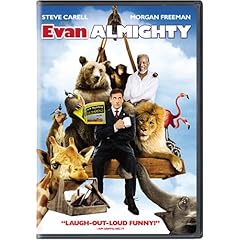 Evan Almighty
Evan Almighty
Directed by Tom Shadyac (Universal Studios, 2007)
Branded as a “comedy of Biblical proportions,” Evan Almighty sunk the ark when it came out last June, with lower than expected box office returns and poor reviews. Making his second appearance as Evan Baxter, Steve Carell failed to produce the laughs that Bruce Almighty, which stared Jim Carrey, did. Still, Evan Almighty, which came out on DVD October 9, succeeds when taken as a family movie with Christian themes rather than a sequel to comedy.
Evan Baxter is a vain Hummer-driving new member of congress who plans to “change the world,” and when he arrives in Washington, God (Morgan Freeman) gives him the opportunity to do just that by building an ark, though, nobody gets killed in this modern-day flood. Along the way, Evan learns the dangers of power, profit, and vanity while gaining an appreciation for family, the environment, and faith. Between scenes featuring cute animals and slapstick comedy (fairwarned: often involving animal excrement), characters reveal simple lessons in decency. God, for example, tells Evan’s wife, Joan, (Lauren Graham) that he does not give somebody patience, courage, or warm fuzzy feelings, but the opportunity to be patient, courageous, or loving.
Perhaps more interesting than the movie are the special features on the DVD. These not only explain the special effects—filming with animals and building a real ark—but also explain how the movie stayed “green.” Evan Almighty is the first movie to be carbon neutral, planting more than 2,000 trees to off-set its carbon emissions. The crew also rode bicycles around the set. Although it is hard to imagine how building an ark that is the size described in the Bible could be environmentally friendly, the building materials were donated to Habitat for Humanity after production.
Evan Almighty is one of Hollywood’s attempts to reach church-goers, but Christians often see through Hollywood’s hypocrisy. At least with its environmental theme, it’s nice to see a movie that practices what it preaches.—Megan Sweas
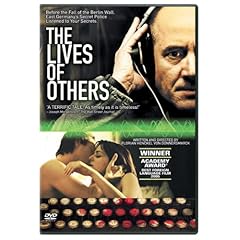 The Lives of Others
The Lives of Others
Directed by Florian Henckel von Donnersmarck (Sony Pictures Classics, 2007)
Unlike George Orwell’s nightmarish parable about a future totalitarian state, director Florian Henckel von Donnersmarck’s (subtitled) taut cat-and-mouse political drama looks back at 1984, remembering a time not so long ago when East Germany’s dreaded Stasi police could still spy on that nation’s citizenry with impunity.
Before the Berlin Wall was torn down, Captain Gerd Wiesler (Ulrich Mühe), one of Big Brother’s most watchful pair of eyes, is assigned to spy on popular playwright Georg Dreyman (Sebastian Koch) and his actress girlfriend Christa Maria Sieland (Martina Gedeck). Watching Wiesler watch Dreyman and Sieland creates a certain voyeuristic unease and distaste. The Stasi officer is a cold automaton, a Stalinist ideologue ready to believe every neighbor is an “enemy of socialism.”
But Donnersmarck’s film is no cookie-cutter parable, and just as Wiesler begins to discover Dreyman’s humanity (and possible innocence), we, too, begin to form an attachment to the police officer who is more complex and less guilty than we had thought. Spying on others may be invasive and unseemly, but it can also create a certain intimacy—even sympathy—and soon the police officer finds himself protecting his prey, covering up critical information. For Wiesler’s prying eyes (and ears) have not only uncovered Dreyman’s personal and political secrets; they have also established that his own assignment was engineered to advance the personal and sexual ambitions of a corrupt official.
As a result both Wiesler and the audience find themselves squeezed into a moral quandary, forced to make and act on judgments about others within the suffocating confines of an unjust society. How should Wiesler judge and treat the increasingly dissident playwright, given the injustices committed against him—by Wiesler himself? And how should we judge the Stasi officer who seeks even a smidgeon of justice in such a setting?—Patrick McCormick
 Sicko
Sicko
Directed by Michael Moore (Dog Eat Dog Films, 2007)
After skewering General Motors (Roger and Me), the National Rifle Association (Bowling for Columbine), and the war in Iraq (Fahrenheit 9/11), Michael Moore has decided to lance the boil of U.S. health care—and he manages to scrape deep into the heart and funny bone with a probing, prophetic satire. This time out America’s premiere muckraking filmmaker wants to know why every other industrialized nation in the world has chosen to make access to health care a basic right, and why the richest country on the planet lets 50 million people fall through the holes of our pay-as-you-go health care system.
In the land of HMOs and private insurers, common “cents” rails against the evils of “socialized medicine,” rife with underpaid docs and interminable lines. But when Moore’s movie takes us on a pilgrimage to awful places like Britain, Canada, France, and Cuba, we discover that the physicians are happy and well-paid, the lines are quite short, and the patients live longer, have lower infant mortality rates, and get better access to health care.
Meanwhile, back in the United States, Moore introduces us to a legion of obstacles and roadblocks littering the corridors of HMOs and insurance companies and keeping millions of Americans from getting the coverage for which they have already paid. Here are the officials who admit their primary task was to exclude and deny the claims and complaints of America’s insured, as well as the reports indicating that drug companies spend much more on advertising and marketing than research and development.
By the time Moore has finished his rounds, it is pretty clear that any health care system that excludes 50 million people and gives us a shorter life span than Castro’s Cubans should be on a respirator, and that the prescription for such a sicko system is universal health care. That’s a bracing tonic, but nobody goes to see a Michael Moore movie to get a placebo.—Patrick McCormick
Albert Pierrepoint (Timothy Spall) approaches his grisly task with the professional detachment (and pride) of a veterinarian putting pets to sleep and records the details of each assignment with the exactness of a bookkeeper. But Pierrepoint is not a soulless automaton, cleaning and tending to the executed bodies with the delicate care of a skilled mortician.
When Pierrepoint is summoned to postwar Germany to execute Nazi war criminals, however, Shergold’s film begins to raise uncomfortable questions about the similarities between England’s hangman and the legions of efficient and meticulous German civil servants who exterminated millions. The officials at Bergen-Belsen also claimed to see themselves as cogs in a larger machine. And though Pierrepoint is determined to show the superiority of British justice, the taint of vengeance seems to spill over onto his work.
Returning to England, the suddenly famous Pierrepoint is hailed by many who see him as an “avenging angel” and reviled by death penalty opponents who accuse him of murder. Unsettled as much by the bloodlust of his fans as the infamy heaped upon him by his critics, the executioner is stripped of the anonymity that had allowed him to practice his craft with such detachment and finds himself faced with an anguishing personal and professional crisis.
Decades after his last assignment, both England and Pierrepoint had turned their back on the death penalty, and Shergold’s tale offers a persuasive narrative in support of that shift.—Patrick McCormick
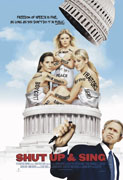 Shut Up and Sing
Shut Up and Sing
Directed by Barbara Kopple and Cecilia Peck (The Weinstein Company, 2006)
When Dixie Chicks vocalist Natalie Maines announced to a London audience in 2003 that she and her bandmates were “ashamed that the president of the United States is from Texas,” she never expected this small protest of America’s impending war in Iraq would provoke a career-shattering rage from millions of country and western fans or that hundreds of conservative radio stations would develop an allergy to freedom of speech and collaborate in a cowardly corporate boycott of one of America’s most popular bands. But, as Isaiah, Jeremiah, and Amos could have told the three country girls from the rolling hills of Texas, nobody likes a spunky prophet.
Tracking the aftershocks of Natalie’s comment and the misbehavior of tens of thousands of fans and radio stations, the musical documentary Shut Up and Sing follows the Dixie Chicks as they return to the United States, face the ire of their former fans and the vitriol of conservative pundits, and try (at first) to make peace and then to get on with their personal and professional lives. In the course of these misadventures, the Dixie Chicks discover the costs of daring to speak up against America’s most disastrous war, and audiences get a sad lesson in the heartland’s intolerance for free speech and political discourse. As much a civics as a music lesson, this film shows all too well how ready many of us are to jump on war’s bandwagon, and how ugly the mob gets once its ire is provoked.
Two years later Natalie’s complaint about Bush and the war have become the rallying cry of Congress and nearly every presidential hopeful (save John McCain), and her shame is shared by millions who felt betrayed by lies about WMDs and links to Al Qaeda. Maybe that’s why the Dixie Chicks took home a bucket of Grammys this year and why this DVD is so popular. The good news is that they’re not even dead and already we’re erecting statues. Maybe our learning curve is shortening.—Patrick McCormick
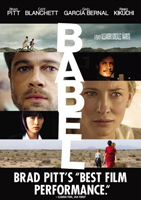 Babel
Babel
Directed by Alejandro Gonzalez Inarritu (Paramount Vantage, 2006)
In Genesis 11 God creates a cacophony of tongues that divides and scatters humanity into a jumble of alienated tribes. Given its title, you might expect this riveting and interlocking tale of four families from Morocco, Mexico, Japan, and the United States to focus on the impenetrable borders created by this linguistic babble. Still, the most heartrending failures of communication are between family members who speak the same tongue but cannot find anything meaningful or redemptive to say to one another.
In this fractured puzzle of a tale we are simultaneously tied to people in faraway places with strange sounding names and cut off from the loved ones who sleep and eat next to us. Richard (Brad Pitt) and Susan (Cate Blanchett) are an American couple who flee into the Moroccan desert to escape their private war over a dead child. Chieko (Rinko Kikuchi) is a deaf Japanese high school student trying desperately to distance herself from the stoic and helpless father with whom she shares the terrible memory of her mother’s suicide. And each of these couples are somehow connected to two other families soon to be shattered by the threat or reality of senseless and tragic death.
Indeed, along with a common inability to bridge the stony silences that drive loved ones apart, each of these families share a tragic vulnerability to a sort of random and chaotic violence from which neither wealth nor distance can protect them. And this is precisely the shared humanity of these tales, the reality that bridges all the linguistic and cultural divides—that all of us are frail, and that each of us, regardless of our differing tongues or cultures, is tied together by the love and grief that makes us human and that drives us into each other’s arms.
Babel is not a tale that promises happy endings if we reach out to one another, but a tragic epic that shows us we have no other option.—Patrick McCormick
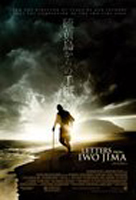 Letters from Iwo Jima
Letters from Iwo Jima
Directed by Clint Eastwood (Dreamworks/Warner Brothers, 2006)
War movies serve as recruitment posters when they recount heroic tales of our brave boys in combat. Or they give voice to our howling grief at war’s insanity when they show the battle scars inflicted on these same courageous lads. But in Clint Eastwood’s startling companion piece to Flags of Our Fathers (Dreamworks/Warner Brothers), we have a war movie that dares to cross the mine-strewn battlefield of our imagination and tell a tale of other people’s sons—of the boys of our enemies.
In this story of the battle of Iwo Jima told entirely from the heroic and doomed perspective of Lt. Gen. Tadamichi Kuribayashi (Ken Watanabe) and a small band of the 20,000 Japanese soldiers holding out against an invasion force five times their size, the American actor/director who has spent over four decades exploring and expanding the language of cinematic violence has created a masterpiece of empathic compassion by making us remember the first thing we forget in war—that our enemies are human beings, and that their slaughter is horror.
We have seen Japanese or German officers making speeches or plans in their native tongue in other war movies, but these clips of cinematic realism were always brief intermissions in the grander tale of our own victory. Here Eastwood and screenwriter Iris Yamashita have fashioned a Japanese tale of war in which the American forces are given the same dismissive treatment we usually reserve for our foes, a tale in which the individual humanity of Japanese soldiers receives the same loving attention our GIs got in Saving Private Ryan (Dreamworks) and Band of Brothers (HBO). Here are men writing home to their wives with apologies for not having taken care of some small household task, and officers saddened to turn their guns on soldiers from a land they have known and loved—America. Eastwood has spoiled our taste for war and made our enemies’ sons our own.—Patrick McCormick
 The History Boys
The History Boys
Directed by Nicholas Hytner (Fox Searchlight, 2006)
Following the chalky and romantic trail of Goodbye Mr. Chips, To Sir With Love, and Dead Poets Society, Alan Bennett’s sparkling coming-of-age comedy about eight working- and middle-class students prepping for their university exams asks whether learning is meant to prepare us for life or success.
In 1983 the British boys’ school where these very adolescent lads are boning up for Oxford’s and Cambridge’s entrance examinations offers its students two opposing views of education and history. The traditional and romantic notion that a liberal education is meant to enrich young hearts and minds, inflaming them with noble passions and infusing a lifelong love of beauty and learning, is effusively defended by the exuberant middle-aged general studies professor Hector (Richard Griffiths), a chubby and bespectacled Mr. Chips character who seems like a cross between the Pillsbury Doughboy and the Energizer Bunny, and who is given to regular outbursts of iambic pentameter.
The opposing thesis—that we learn to earn, that education is but a set of skills to help us vanquish obstacles and opponents, and that history is merely a catalogue of characters and events that we may endlessly reinterpret and rearrange to our own ends and amusement—is glibly advanced by the school’s spanking new history tutor Irwin (Stephen Campbell Moore). Being the younger and flashier of the two, Irwin gets many of the film’s best lines, while Hector’s over-the-top affection for learning can border on the embarrassing.
Still, the movie’s heart and sympathies belong to the old-fashioned Mr. Chips. Frances de la Tour does a wonderful turn as Dorothy Lintott, the school’s regular history teacher and Hector’s sympathetic colleague, and Dominic Cooper (Dakin) and Samuel Barnett (Posner) are strong leads in an exuberant, funny, and fast-talking cast of young men deciphering the past and deciding their future. —Patrick McCormick
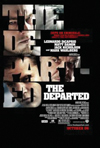 The Departed
The Departed
Directed by Martin Scorsese (Warner Brothers, 2006)
Martin Scorsese doesn’t believe in nations; he believes in tribes. For him all politics is local and bloody, and tribal loyalty holds together the patchwork of neighborhoods we mistake for society. In Goodfellas (Warner Brothers), manhood and membership in society are achieved by keeping a blood oath to one’s gang, and in Gangs of New York (Miramax), the birth of our modern urban nation is forged in a bloody caldron of tribal wars. We are, for Scorsese, a land of “Bloods” and “Jets,” an urban Balkans populated by violent men.
This time out the warring tribes are the cops and robbers, and with an extraordinary and gifted cast, Scorsese has constructed a tale of two gangs immersed in mortal combat, each with their own matching warlords, captains, and foot soldiers—and each with their own spy behind enemy lines. The hoods are led by Frank Costello (played with delicious malevolence by Jack Nicholson), who has infiltrated a Boy Scout look-alike named Colin Sullivan (Matt Damon) into the ranks of Massachusetts’ finest. Captain Queenan (a paternal and determined Martin Sheen) heads the trooper’s tribe, recruiting an equally bright-eyed lad by the name of Billy Costigan (Leonardo DiCaprio) to run with Costello’s wolves.
On the surface Scorsese’s film works well as an edgy thriller, with Damon and DiCaprio playing their murderous game of cat and rat. But on a deeper level, this tribal tale examines the costs of loyalty and betrayal. Damon, who only has to pass for a hero, has the easier part, though he too knows the risks of failure and begins to pang for a life he cannot have. But DiCaprio is a man descending into hell, repeatedly forced to betray himself to pass for Nicholson’s rising protégé, paying an escalating and suicidal bill for his progressive alienation from himself and the tribe that has tossed him away.
If Scorsese is right, and we all live do in tribes, The Departed asks about the price we pay to belong—or leave.—Patrick McCormick
 The Queen
The Queen
Directed by Stephen Frears (Miramax, 2006)
Just a year after her triumphal performance as the regal Elizabeth I in the HBO miniseries, Dame Helen Mirren has taken on the crown again in Stephen Frears’ scathing study of the royal ruins of Elizabeth II’s ceremonial monarchy. In her first outing as Good Queen Bess, Mirren—who has won repeated accolades for her portrayals of iron maidens and virgin queens like Prime Suspect’s Detective Inspector Jane Tennison and Gosford Park’s headmistress Mrs. Wilson—showed audiences the grit and guts with which England’s first queen forged the era named after her. But in Frears’ film the current occupant of Buckingham Palace lives in a decidedly post-Elizabethan era, and her subjects see the queen’s ramrod spine and stoic manners as signs of cold and aloof indifference, not courage or conviction.
Recounting the tale of the week Princess Diana was killed in a Paris car crash, Frears and Mirren take us inside the decaying doll house of England’s royal family, with unsettling close-ups of the dysfunctional cast running around behind the royal curtains and sweeping aside the tattered remains of our Cinderella fantasies about Charles and Diana. Behind all the pomp and ceremony this modern major monarchy turns out to be nothing more than a celebrity family whose real purpose is to provide tabloids and talk shows with endless streams of gossip. “What—we ask ourselves—are the royals doing tonight?”
And so The Queen does more than point an unflattering light at Elizabeth II and her clan. In a film illustrating the irrelevance of England’s ceremonial monarchy, Frears also turns over the rock of our modern and often pathological obsession with celebrities, suggesting that the age of Diana, with its endless public confessions and cannibal-like feasting on the scabs of ruined lives, is hardly an improvement on what came before. Replacing royal celebrities with political ones does little to move us into the age of reason—or adulthood.—Patrick McCormick
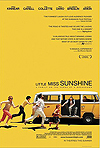 Little Miss Sunshine
Little Miss Sunshine
Directed by Jonathan Dayton and Valerie Ferris (Fox Searchlight, 2006)
The marital and directorial team of Jonathan Dayton and Valerie Ferris have graduated from music videos to a heartbreaking knee slapper about a dysfunctional family crammed into a malfunctioning VW bus. Along with novice screenwriter Michael Arndt and a heavenly cast, they have crafted a truly original and achingly funny tale about the road trip to hell and back. It is a pilgrimage made infinitely more exasperating and endearing by the loved ones with whom it is shared. Imagine The Grapes of Wrath meets National Lampoon’s Family Vacation, and you have an inkling of the Hoover family’s sad and sidesplitting sojourn from dusty suburban Albuquerque to sunny California.
Self-help wannabe Richard Hoover (Greg Kinnear) urges his tiny audiences to “Refuse to lose,” but his nine-step plan for success can’t pull his own marriage or family out of the cellar. Teenage son Dwayne (Paul Dano) is stuck on Nietzsche and a vow of silence. Potty-mouthed Grandpa (Alan Arkin) fills the void with a geriatric rap on heroin (which he uses regularly) and sex (which he misses sorely). The disarmingly charming 7-year-old Olive (Abigail Breslin) lives in a dream world way over the rainbow. Meanwhile, longsuffering wife and fragile optimist Sheryl (Toni Collette) has taken in her suicidal brother Frank (Steve Carell), a Proust scholar not rebounding from the loss of his lover and a MacArthur genius grant.
When this motley crew hits the road to Redondo Beach for the Little Miss Sunshine beauty contest, which is too scary for words (and for which young Olive is preparing a deliciously surprising talent), the ensuing sojourn reveals all the creaks and cranks in both the family and its yellow Volkswagen, while taking a couple of deft shots at our winner-take-all society and the way our American fixation with success leaves so many by the wayside. All in all, a bumpy ride well worth taking.—Patrick McCormick
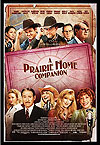 A Prairie Home Companion
A Prairie Home Companion
Directed by Robert Altman (PictureHouse, 2006)
Good Night, and Good Luck (Warner Independent) took us back to the early days of television with a morality tale about the duties of a free press—not merely to entertain and distract, but also to inform, educate, and question. In this movie translation of A Prairie Home Companion, the long-running National Public Radio program, Garrison Keillor is no Edward R. Murrow, and his old-fashioned radio show is clearly meant to entertain audiences listening for their weekly doses of Lake Wobegon. Still, amidst the nostalgic, amusing, and heartfelt entertainment of Robert Altman and Keillor’s rendition of “the last radio show,” one finds a sly but distinctly political message. They’re raising a ballad for the common man and woman.
Altman and Keillor are longstanding fans of the misfit, storytellers who build their narratives and ensemble casts from the fractured lives of small, imperfect people, folks unaccustomed to limelight, power, or wealth. And out of that marbled humus of warts and wrinkles they fashion odes to the virtues of common folk, offering populist sermons on the dangers of those distinctly American temptations to wealth and the arrogance of power.
In this joint outing a small-town cast of aging performers puts on one last show, pulling down the curtain on a way of life that reaches back before the fall of the family farm or the rise of cable. Meryl Streep and Lily Tomlin are a matching set of sweet and salty singing sisters with more memories than dreams. Woody Harrelson and John C. Reilly play guitar-strumming cowpokes with a taste for raunchy jokes but no home on the range, and Kevin Kline’s ex-private eye Guy Noir now guards the stage door against all manner of threats, including tycoon and show-stopper Tommy Lee Jones, who has come to bury rather than praise Keillor and gang.
However the story ends, Altman and Keillor’s sympathies are with the values that made America small and friendly, not big and powerful.—Patrick McCormick
 An Inconvenient Truth
An Inconvenient Truth
Directed by David Guggenheim (Paramount Classics, 2006)
In David Guggenheim’s new documentary former Vice President Al Gore (who calls himself the man “who used to be the next president of the United States”) makes it clear that the most dangerous secret being kept from the American public is not that Jesus wed Mary Magdalene but that global warming is not a “theory.”
As Gore and Guggenheim show, nearly a thousand recent scientific articles and essays accept the fact of global warming without question, yet our own media and White House continue to treat this planetary threat as a myth or fable, resulting in an American public being kept in the dark about the most urgent crisis of our age. And though it may be easier for many Americans to grasp the perils of global warming than to imagine Al Gore presenting a fascinating 90-minute slide show on the dangers of climate change, Guggenheim’s documentary and the surprisingly engaging and soulful Gore are by turns educational, entertaining, and riveting. With a mixture of slides, graphs, statistics, and cartoons, Professor Gore drives home the case that global warming is an indisputable fact, that severe climate changes are being introduced by our consumption and burning of fossil fuels, that these changes will have planetwide and permanent effects on our way of life and on the lives of billions of present and future residents of our world, and that we must—in spite of our politicians and press—wake up to the present crisis and make real changes in the way we live, work, and play.
Of course the thing that makes it easy for Gore and Guggenheim is that they have all the evidence on their side, which only makes it more tragic that global warming remains America’s “best kept secret” and more urgent that we follow the lead of the candidate who won the popular vote in 2000. Perhaps the way to avoid the dangers to climate change is to engage in regime change.—Patrick McCormick
 Akeelah and the Bee
Akeelah and the Bee
Directed by Doug Atchison (Lions Gate Films, 2006)
After Spelling Bee in 2004 and last year's Bee Season, the release of Doug Atchison's movie about a South Central Los Angeles 11-year-old who can spell like a "B-R-A-I-N-I-A-C" could signal the rise of a new film genre—the spellbeender. Soon cable will have a reality show about the backstage bickering of fourth- and fifth-grade contestants, or popular TV stars will compete in a "Celebrity Spelling" show, with losers commiserating about the homonyms or prefixes that tripped them up.
The startling success of the spelling bee genre might be explained by the "cuteness" appeal of its preadolescent contestants or the dramatic tension of the winner-take-all competition. One of those doe-eyed tykes misses a silent consonant and it's over. And there is always the nerd appeal of these films—in spellbeenders the jocks and prom queens are stuck on the sidelines cheering for the kids with plastic pencil protectors. Hooray for the little (and geeky) girl or guy.
But spelling bee films also touch a national nerve about the inferiority of American schools, students, and study habits, and remind us of the intense personal labor and attention required for real teaching. The kids who succeed in these films get to the "Nationals" the way violinists get to Carnegie Hall—practice, practice, practice—and the parents or mentors who coach and train them give their undivided attention, a feature all too rare at the thousands of the overcrowded factory schools dotting the American landscape.
Akeelah (Keke Palmer) turns in a letter-perfect performance as a bright preteen who knows the costs schoolgirls can pay for being too smart but who discovers a talent and an appetite even her tired and resentful mother (Angela Bassett) can't dampen. Dr. Larabee (Laurence Fishburne) engages and mentors his young pupil with a passion and skill that will inspire the envy of every student (and former student) in the cineplex.—Patrick McCormick
 Inside man
Inside man
Directed by Spike Lee (Universal, 2006)
Heist films come in two flavors: films noirs like The Asphalt Jungle and Dog Day Afternoon in which the well-laid plans of a crew of thieves unravel and implode, and cunning capers like To Catch a Thief and The Thomas Crown Affair in which a clever thief outwits both the cops and the audience. We like the first because bad guys should be punished. We like the second because we want our anti-heroes to get away.
With an edgy Hollywood outsider like Spike Lee directing this particular heist, the smart money might be on the noir genre, particularly since Inside Man has so many references to director Sidney Lumet's Dog Day Afternoon. Still, with heartthrob Clive Owen playing bank robber Dalton Russell, it seems unlikely audiences will applaud his demise.
Either way, the real pleasure of Lee's film comes from the cat-and-mouse game between Russell and Denzel Washington's Detective Keith Frazier, an ambitious and savvy cop with plenty of smarts and cunning of his own. Watching these two feint and jab at each other is like seeing Ali dance with Smokin' Joe. You want them both to win. At its heart Inside Man is a buddy movie, with two competitors playing at the top of their game, and audiences savoring the pleasure of the company of both of them.
Other treats in this small jewel of a film come from watching the bank robbers pull off their heist with the silky precision and coordination of a Swiss timepiece, and from seeing ice queen insurance consultant Madeline White (Jodie Foster) move back and forth between cops and robbers with the buttery neutrality of a Swiss banker. Halfway through the story Lee's caper film morphs into something a bit more interesting, and Christopher Plummer offers a chilling little turn as the good-bad guy who may have had it coming all along. As Bogie said in The Maltese Falcon, somebody has to take the fall.—Patrick McCormick
 Syriana
Syriana
Directed by Stephen Gaghan (Warner Brothers, 2005)
Edward R. Murrow complained in George Clooney’s last film that television should occasionally educate the American public, and if Good Night and Good Luck, Munich, and Syriana are any indication, school is definitely in session in Hollywood—and the course is political science.
In Syriana, writer/director Stephen Gaghan has crafted a brain-teasing political thriller, starring Clooney, about what nations and corporations are willing to do for a shrinking pool of oil. This multifaceted nightmare about corruption, greed, and terror might not just make us smarter but could improve our performance as citizens.
Untangling and interpreting Gaghan’s knotty web of tales about burnt-out CIA agents, greedy oil tycoons, and cynical Washington operatives takes some heavy lifting, but so does citizenship, and if the complexity of plotlines in Syriana has us wanting to throw up our hands in confusion and surrender, Gaghan and Clooney’s scathing view of the all-too-human politicos and CEOs normally entrusted to make these hard choices for the rest of us is enough to make anyone sign up for Citizenship 101.
Like Traffic and Crash, other recent cinematic feats of serpentine storytelling, Syriana rejects both the narrow perspective of a single narrator and the simplistic approach of a tale of heroes and villains, offering instead a merry-go-round set of perspectives introducing a cast of sympathetic but complex and flawed characters, none of whom is in control of the whole story. This is perhaps the most radical challenge of Gaghan’s thriller, for his way of storytelling questions the very assumptions of Washington’s one-sided, simplistic, and predigested view of the world.
If Socrates was the best teacher because he asked unsettling questions instead of providing easy-to-consume lectures, perhaps Murrow would be proud of the educator Clooney has become.—Patrick McCormick
 The three burials of Melquiades Estrada
The three burials of Melquiades Estrada
Directed by Tommy Lee Jones (Sony Pictures Classics, 2005)
The Western that didn't make it to the Oscars this year was also a laconic tale about the bond between two cowpokes, but the borders Melquiades Estrada (Julio Cedillo) and his friend Pete Perkins (Tommy Lee Jones) cross illicitly are ethnic and national, rather than sexual. Actor/director Jones and writer Guillermo Arriaga have cooked up a Tex-Mex parable that is part Cormac McCarthy (The Crossing), part John Sayles (Lone Star), and more than a smattering of John Ford, John Huston, and Sam Peckinpah.
Arriaga, who favors Quentin Tarantino-esque tales that double back to bite you in the keester, lays out his story in both the past and present tense. One trail follows the amiable and unlikely friendship of cattle foreman Perkins and his illegal ranch hand Estrada, while the other picks up Perkins' tracks as he sets out to avenge his buddy's wrongful death.
When buzzards dig up Estrada's murdered body in a shallow grave, the local sheriff (Dwight Yoakam) has little interest in uncovering the killer of another illegal, and Estrada is soon reinterred. But Perkins, who has promised to return his friend's body to the family plot in Mexico, is determined to get to the bottom of things. So he kidnaps Estrada's killer, digs up his buddy's corpse, and sets off on a pilgrimage of atonement across a hardscrabble landscape dotted with craggy deserts and sunburned border towns where folks swing between boredom and brutality.
More than a simple tale of Western vengeance, Arriaga and Jones' high-plains parable offers a number of nice twists and introduces us to some memorable characters, while the journey into the wilderness provides a couple of opportunities for a punishment that fits the crime—offering the possibility of repentance and redemption. Tommy Lee Jones may be more locust than honey, but he's a voice crying in the desert that we won't soon forget.—Patrick McCormick
Other recommended titles
 |
A Very Long Engagement (Warner Brothers, 2004). In Jean-Pierre Jeunet’s tale of lovers separated by war, Mathilde (Audrey Tautou) is convinced her fianc? Manech (Gaspard Ulliel) did not die in the trenches and begins a furious quest to find the truth and her beloved. Her pilgrimage uncovers the barbarity and savagery of the “Great War,” in which cruel and indifferent leaders feed their nation’s sons to the jaws of death, and broken men offer their own pound of flesh to buy a ticket home. It’s also a tale of courage, hope, and love—and both Mathilde and Manech give us reason to believe in the redemptive capacity of the human spirit. |
|
|
City of God (Miramax, 2002). Director Fernando Meirelles tells a tale of two cities in this film about Rio de Janeiro slums, where the poor have been cut off from metropolitan services and abandoned to the murderous gangs that rule and rob them. In this “City of God,” young men like Rocket (Alexandre Rodrigues) have little chance for a real childhood but must struggle to survive the violence of the streets without being sucked into its fatal maelstrom. This he does with a stolen camera that allows him to find a career and a means to tell the stories of the boys who didn’t get away. |
|
|
Crash (Lionsgate, 2005). Imagine Babel at rush hour. Then imagine the clown that just cut you off is one of those stinking Samaritans. The decidedly uncosmopolitan citizens of Paul Haggis’ balkanized Los Angeles live and work cheek to jowl with a rainbow coalition of races and ethnicities, all the while muttering and screaming a common string of racial epithets and slurs at their unloved neighbors. Still, the citizens of this polyglot boiling pot are not one-dimensional bigots, and Matt Dillon and Sandra Bullock’s portrayals of spiteful but complex characters are as tough to turn away from as a 16-car pileup. |
|
|
Gangs of New York (Miramax, 2002). At Gettysburg in 1863, Lincoln praised forefathers who brought forth a nation conceived in liberty and dedicated to equality. But Martin Scorsese’s violent epic about the 1863 Draft Riots paints a different picture of the birth of a nation. In the alleys and tenements of New York a modern industrial society is forged in a bloodbath of warring tribes of nativists and immigrants—refereed by a corrupt political machine that lives off the blood and bodies of the poor. Even the national government’s battle against slavery consumes thousands of the bodies of the poor in its gargantuan war machine. Not for the faint of heart. |
|
|
I, Robot (Twentieth Century Fox, 2004). In this sci-fi thriller loosely based on a book by Isaac Asimov, Detective Del Spooner (Will Smith) has a bias against the legion of robots serving mid-21st-century Chicago, and everyone from his saintly aunt to the head of U.S. Robotics (Bruce Greenwood) is convinced he’s paranoid. But when one of the ‘bots is accused of tossing his maker out a window, it looks like Spooner might not have a screw loose after all, though there are a couple of machines trying to throw a wrench into his works. Suddenly even the robot psychiatrist (Bridget Moynahan) thinks it may be time to unplug the help. |
|
|
Mean Creek (Paramount, 2004). Director Jacob Aaron Estes has created a violent and unsettling parable about school yard bullies and the ways we stand up to them. Many an adolescent and middle-aged viewer will identify sympathetically with Sam (Rory Culkin), the teenage victim of a playground bully named George (Josh Peck), and most will enjoy the fantasy of turning the tables on George with a humiliating prank. But as Sam and his friends set out to even the score, they soon discover that George may not be the monster they thought and that their revenge could have monstrous consequences of its own. |
|
|
The Merchant of Venice (MGM, 2004). Shakespeare’s dark comedy about Venetian merchants and moneylenders repels and attracts modern audiences. We are uneasy about its blatant anti-Semitism, about the rendering of Shylock (Al Pacino) the moneylender as a hateful, venal caricature. He reminds us of all our bigoted stereotypes and all the cruelty and injustice that go along with them. But he is also an articulate spokesman for all that rages against the injustices we perpetrate on those whose pound of flesh is simply a piece of meat to us. Some comedies make us uncomfortable—but that’s no reason not to see them. |
|
|
Sky Captain and the World of Tomorrow (Paramount, 2004). In this campy mix of futuristic sci-fi and WWII romance, the daring but adorable reporter Polly Perkins (Gwyneth Paltrow) tracks a band of missing German scientists while an armada of robotic transformers rain terror on a future New York that looks a lot like the 1940s. Thrown together with intrepid fighter pilot and one-time beau Joe Sullivan (Jude Law), the pair seeks to uncover and foil a doomsday plot involving robots, rockets, and the underground lair of—yes, a resurrected Lawrence Olivier! As they say in Oz, pay no attention to the plot. Just sit back and enjoy the ride. |

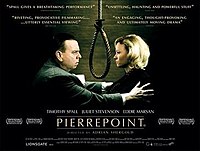 Pierrepoint (The Last Hangman)
Pierrepoint (The Last Hangman)




